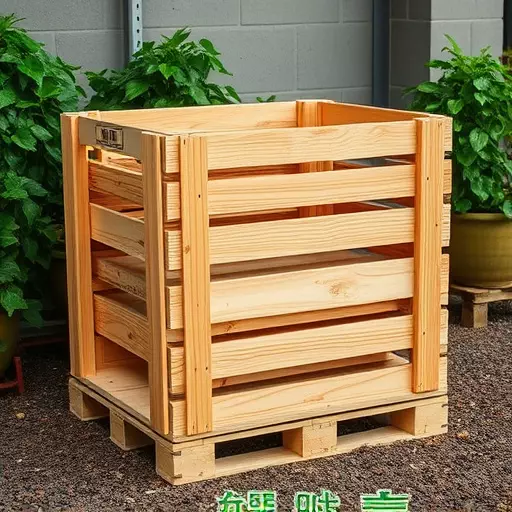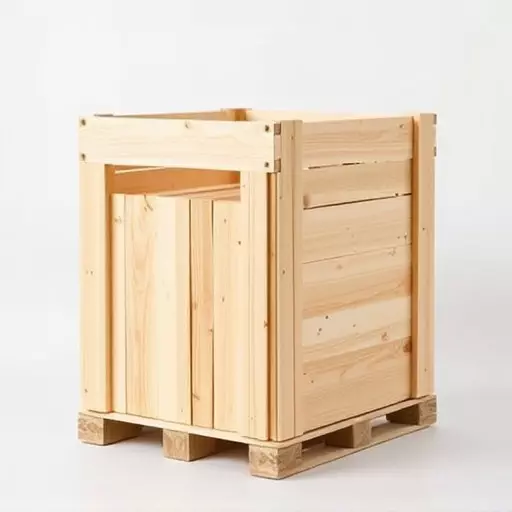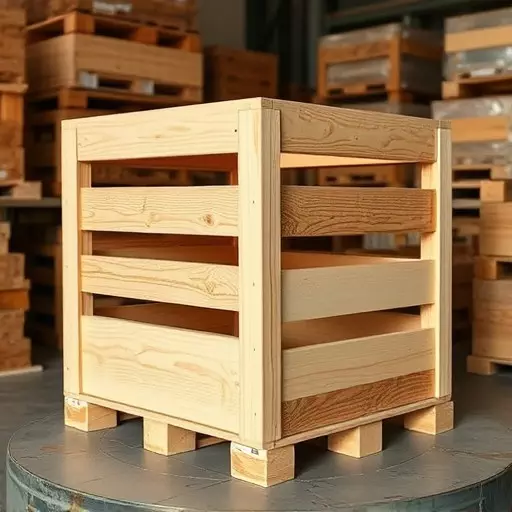Sustainable wood crate manufacturing in Holland, Ohio, is revolutionizing packaging with eco-friendly alternatives. Multi-layered corrugated cardboard combines recyclable materials to create robust wooden crates, reducing environmental impact and waste compared to traditional plastic packaging. Local businesses are leading this green initiative, offering custom-designed, fully recyclable wood crates that cater to modern consumers' demand for greener options while ensuring product protection during shipping. This shift aligns with global efforts to minimize carbon footprints, conserve natural resources, and promote a circular economy.
Discover the future of packaging with multi-layered corrugated solutions. This innovative approach combines strength and sustainability, offering businesses an eco-conscious alternative to traditional methods. From understanding the basics to exploring design advancements, this article delves into the advantages of recyclable wood crates, particularly highlighting sustainable manufacturing practices in Holland, Ohio. Learn how these solutions contribute to environmental conservation and the challenges and opportunities they present for businesses embracing green packaging.
- Understanding Multi-Layered Corrugated Packaging: An Overview
- The Benefits of Eco-Friendly Wood Crate Solutions
- Sustainable Wood Crate Manufacturing in Holland, Ohio: A Case Study
- How Recyclable Wood Crates Contribute to Environmental Conservation
- Design and Innovation in Multi-Layered Corrugated Packaging
- Adopting Green Packaging: Challenges and Opportunities for Businesses
Understanding Multi-Layered Corrugated Packaging: An Overview

Multi-layered corrugated packaging, often referred to as multi-layer cardboard or composite boards, is a game-changer in sustainable wood crate manufacturing. This innovative approach combines multiple layers of corrugated material and other materials like linerboards and facings to create robust and eco-friendly wood crate solutions. The process involves advanced techniques in paper and board production, ensuring high-quality, durable crates that can withstand various shipping conditions while minimizing environmental impact.
In the world of packaging, especially in Holland, Ohio, where sustainable wood crate manufacturing is prominent, these multi-layer designs offer a significant advantage. By utilizing recyclable materials, these wooden crates not only reduce waste but also provide an efficient and cost-effective alternative to traditional packaging methods. Eco-friendly wood crate solutions are becoming increasingly popular as businesses strive to meet consumer demands for greener options without compromising on product protection and delivery efficiency.
The Benefits of Eco-Friendly Wood Crate Solutions

The shift towards eco-friendly packaging has gained significant momentum in recent years, and businesses are increasingly seeking sustainable alternatives to traditional materials. One notable solution is the adoption of eco-friendly wood crate solutions, particularly in regions like Holland, Ohio, where sustainable wood crate manufacturing has become a prominent focus. These wooden crates offer a compelling alternative to their plastic counterparts, not only because they are recyclable but also due to their ability to reduce environmental impact throughout their lifecycle.
By opting for reusable and recyclable wood crates, companies can contribute to the preservation of natural resources. Unlike plastic, which is known for its longevity in the environment, wood is a renewable resource that can be sustainably harvested and reclaimed. This eco-conscious approach not only minimizes waste but also encourages a circular economy where materials are continually reused and recycled, fostering a greener and more sustainable future for packaging solutions.
Sustainable Wood Crate Manufacturing in Holland, Ohio: A Case Study

In Holland, Ohio, a pioneering approach to sustainable wood crate manufacturing is reshaping the industry’s environmental footprint. This case study highlights an innovative company that has embraced eco-friendly practices, producing recyclable wood crates with a minimal impact on the planet. By utilizing locally sourced wood and implementing rigorous recycling programs, they offer a compelling solution for businesses seeking greener alternatives in packaging.
The process involves advanced craftsmanship and modern technologies to create durable, yet sustainable, wooden crates. Every step is meticulously designed to reduce waste and energy consumption without compromising strength. This commitment to eco-conscious manufacturing has not only attracted environmentally conscious clients but also set a new standard for the industry, demonstrating that high-quality, recyclable wood crates can be a viable and stylish choice for modern businesses.
How Recyclable Wood Crates Contribute to Environmental Conservation

In the pursuit of sustainable packaging solutions, recyclable wooden crates are emerging as a powerful tool for environmental conservation. Companies specializing in sustainable wood crate manufacturing in Holland, Ohio, are at the forefront of this eco-friendly shift. They employ innovative techniques to create robust and durable crates from renewable resources, reducing reliance on non-biodegradable materials. By adopting sustainable wood crate manufacturing practices, these businesses not only provide robust packaging solutions for various industries but also contribute significantly to a greener planet.
Eco-friendly wood crate solutions offer multiple environmental benefits. Wooden crates, unlike their plastic counterparts, are fully recyclable and biodegradable, ensuring minimal impact on ecosystems. Furthermore, the use of locally sourced wood promotes sustainable forestry practices, preserving natural habitats and reducing carbon footprints associated with long-distance transportation of raw materials. With an increasing consumer demand for eco-conscious products, businesses adopting these practices are not just meeting environmental standards but also gaining market favor as responsible corporate citizens.
Design and Innovation in Multi-Layered Corrugated Packaging

In the realm of sustainable packaging, multi-layered corrugated cardboard has emerged as a game-changer. This innovative design combines multiple layers of corrugated fiberboard to create robust and eco-friendly wood crate solutions. Companies like those involved in sustainable wood crate manufacturing in Holland, Ohio, are at the forefront of this revolution, offering recyclable wood crates that cater to modern consumer demands for environmentally conscious products.
The beauty of multi-layered corrugated packaging lies in its versatility and strength. By strategically layering different types of cardboard, manufacturers can create custom solutions that protect fragile items or withstand harsh transportation conditions. This design approach not only ensures the integrity of the packaged goods but also reduces waste, as the material is fully recyclable and often made from sustainable sources. These eco-friendly wood crate solutions are transforming the logistics industry by offering a viable alternative to traditional packaging methods.
Adopting Green Packaging: Challenges and Opportunities for Businesses

Adopting green packaging practices presents a significant opportunity for businesses to reduce their environmental impact and contribute to a more sustainable future. One key area where companies can make a difference is through sustainable wood crate manufacturing, an eco-friendly alternative to traditional corrugated packaging. Located in Holland, Ohio, many businesses are now turning to local suppliers offering recyclable wood crates and innovative eco-friendly wood crate solutions. This shift towards green packaging not only minimizes waste but also reduces the carbon footprint associated with transportation, as locally sourced materials cut down on long-distance shipping.
However, there are challenges that come with implementing such changes. Businesses need to invest in new equipment and processes for sustainable wood crate manufacturing, which can be a significant upfront cost. Additionally, ensuring consistent quality and supply of recyclable materials requires careful planning and partnerships with reliable suppliers. Despite these hurdles, the benefits of adopting eco-friendly wood crate solutions are substantial, offering businesses a chance to stand out as environmentally responsible corporations while contributing to a greener industry landscape.


